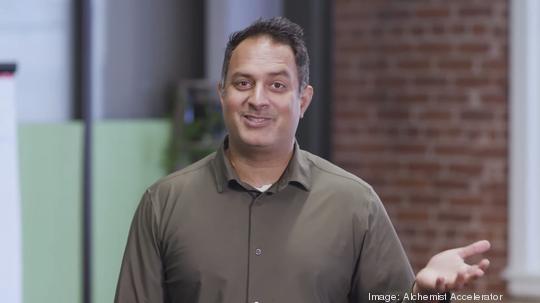
The singularity is nearing, and Ravi Belani hopes to push it forward.
The founder and managing director of Alchemist Accelerator recently oversaw the company's fourth virtual Demo Day, which had 900 attendees and showcased 23 companies. The San Francisco-based accelerator is focused on a universe of business-to-business startups, rather than on companies that appeal to consumers.
Belani said he's amazed that the pandemic has not slowed innovation. Instead, he believes the pace of innovation appears to be accelerating, and the ever more virtual world is helping facilitate unprecedented collaboration across the globe. In other words, that idea of singularity — that point in time when tech becomes uncontrollable and radically changes how we live — isn't that far away.
The Silicon Valley Business Journal sat down with Belani over Zoom to talk about Alchemist Accelerator's latest initiatives, and how the pandemic may have pushed humanity closer to that point. The interview has been edited for length and clarity.
Do you think the pandemic catalyzed movement toward a global technological singularity?
First, it's interesting that it didn't slow it down. In fact, it accelerated it. So I think that's the interesting point; the innovation of Moore's law, the density of circuits, has continued to double every 18 months. That is crazy. And that just astounds me, because it feels like we've lived through this pandemic, and everything was put on hold. But it wasn't; technology continues to innovate...
The exciting and threatening thing about the singularity is that technology will reach a point pretty soon where we won't be able to even forecast the future, because the acceleration of the innovation of technology will far surpass our ability to even understand it. Then the only thing you can do is just enjoy the ride. But the experience is going to be one of perpetual shock, where you're perpetually surprised at the innovations that are coming out, because they're beyond what you could have anticipated. And I think we're starting to see elements of that. You're seeing these developments on collaboration platforms that are more novel than what we've ever used in the past. In telehealth, I think there's been a huge push. Everybody's been talking about telehealth for a while, but the Covid crisis really made that a reality, where you can do so many different services now just completely virtually.
We're starting to see lots of different companies that are evolving on co-creating technology with the human experience. That's where I think things start getting pretty exciting, is when we're starting to see these hybrid models of humanity and technology co-existing in new and novel ways. We had a few examples of those at the Demo Day. There was companies like OnTrack Rehab, which is building this mobile device to allow elderly people not to fall, and it's an interactive device where the phone is actually providing the therapy. Or Esper Bionics, which is the most in-your-face example of humanity and technology merging, they have an AI-enabled prosthetic hand. Where "human" ends and technology begins gets very, very blurred... you're seeing these examples of technology that are emerging during Covid that are speaking to what's going to come if or when the singularity actually arrives.
Do you think Silicon Valley as a brand has diminished in value?
I don't think it's necessarily diminished, but I think its singular importance has maybe diminished. I think Silicon Valley will continue to be strong, but I think that doesn't mean that other areas don't become stronger, as well. I do think that this is a secular shift, where you're going to see a lot more distribution of unicorns, to be more uniformly distributed than it's been in the past. Silicon Valley has historically had dominance on the number of unicorns, partly because a lot of the venture capital dollars were here. Everybody would chase the money, and the money was all in Silicon Valley.
What's been significant about Covid is that the money is leaving; you're seeing prominent venture capitalists that are leaving Silicon Valley, or leaving San Francisco, and that is something that hasn't really happened before. Even the investors in Silicon Valley are quickly getting adapted to a virtual world, whereas in the past they would want to drive to the startups and see them physically. That need is not there anymore. That superficial need was a lot of the reason why they insisted that startups had to be housed in Silicon Valley ... There's a variety of factors that are shifting away the requirements and the dominance that Silicon Valley has historically had. It still is Mecca for many tech entrepreneurs, and we do still find founders that we fund that still want to come to Silicon Valley, regardless of the pandemic, especially international founders. But you're going to see more unicorns coming from all over the world in a more distributed way. And the money's also following that, and you're seeing the money get distributed outside of Silicon Valley.
Can you talk about some of Alchemist's latest initiatives?
There's a lot of exciting new things happening. There's a business unit within Alchemist that's called AlchemistX, which does innovation services, both with corporations and with governments. And for the first time, we have explored and are announcing these government partnerships where we're working with government bodies to create new ways to drive innovation... The one that speaks to our intention behind it is Canada. We're co-creating something that we don't think you can do on your own as an accelerator, or on your own as a government. There's a partnership where the Alberta government and the City of Edmonton are going to be giving us access to all their data for startups to build companies for community wellness and health, and also for social impact. We'll be running the program with the Canadian government, and also some of the leading machine intelligence and data scientists out of AMI (Alberta Machine Intelligence Institute), which is one of the top three AI institutes in the world.
Do you anticipate continuing to hold Demo Days virtually?
I think the Demo Days will always have a virtual element to it. What we found is that the virtual Demo Days are far more democratizing; more people get access, and all the scores have been higher. I doubt we're going to move to fully in-person. Having said that, there are certain elements that we can't capture virtually. That includes the bonding that people want to have. A lot of the reason people came to Demo Days in the past was — they obviously liked the startups — they wanted to network with each other. We have to find a solution to that. There also might be a virtual-hybrid thing where we do also something in person or have some version of that, and that's going to also flow into the program. The program will always have a virtual element, but we'll be interspersing physical elements, too. And we might also have a physical program running in parallel with a hybrid program.






